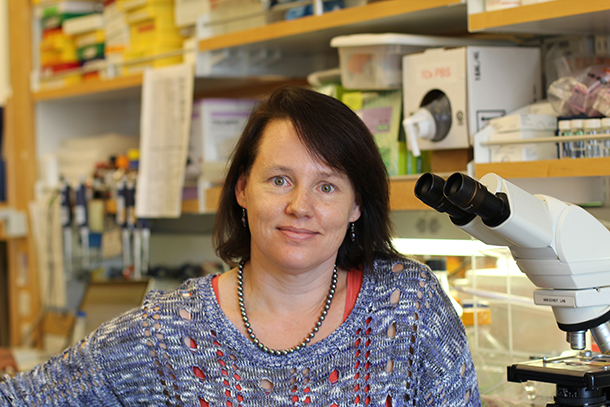Tracy C. Grikscheit, MD, a principal investigator with USC Stem Cell and The Saban Research Institute of Children’s Hospital Los Angeles, has received a $7.1 million grant from the California Institute of Regenerative Medicine (CIRM) Translational Research program to develop a cellular therapy for the treatment of nerve disorders of the digestive system. These disorders, called enteric neuropathies, include degenerative neuromuscular conditions as well as those caused by a deficient or missing nerve supply to the intestines. Currently, in many cases the only treatment is removing segments of intestine that do not have a properly formed nervous system.
“Our goal is to develop an ‘off the shelf’ cellular therapy to treat enteric neuropathies before patients require surgery or to rescue patients who still have symptoms following surgery,” said Grikscheit, who is also an associate professor of surgery at the Keck School of Medicine of USC and the USC Viterbi School of Engineering.
Working with human induced pluripotent stem (iPS) cells that have the ability to develop into many human cell types, Grikscheit proposes to generate nerve cells from “superdonor” iPS cell lines that are immunologically matched to a large portion of the population. Because these cells would match many patients, Grikscheit hopes to reduce or remove the requirement for immunosuppressive drugs that are often required for transplantation.
This cellular treatment, called Advanced Superdonor Cellular Enteric Neuropathy Therapy (ASCENT), could replace absent or diseased components of the enteric nervous system—the cause of medical conditions such as Hirschsprung disease. The work will include collaboration with scientists at Cedars Sinai Medical Center, University of Michigan and Cincinnati Children’s Hospital. Grant reviews made available publicly online praised the team as having “great expertise” and noted that “the team could perhaps be the best in the world for this indication.”
“The goal of our translation program is to support the most promising stem cell-based projects and to help them accelerate that research out of the lab and into the real world, such as a clinical trial where they can be tested in people,” said Jonathan Thomas, PhD, JD, chair of the CIRM Board. “The projects that our board approved are a great example of work that take innovative approaches to developing new therapies for a wide variety of diseases.”
— Ellin Kavanagh


